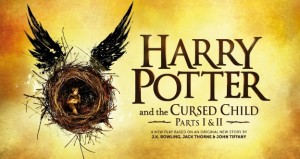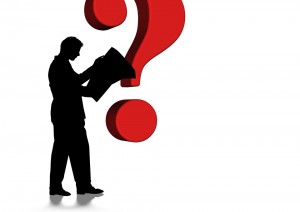 Recently, the magical world was caught by storm with the release of “Harry Potter and The Cursed Child” – a brand new book in the fabled Harry Potter universe! Hooray! Fans of the books have waited for almost ten years for a new entry in their beloved franchise, and it seems like they finally got it! Oh, what magical adventures await Harry, Ron and Hermione this time? But wait a minute… Something about that Amazon page seems kind of off… This isn’t a book, it’s a play script! And worst of all, it’s not even written by “Harry Potter” author JK Rowling, but rather by some dude named Jack Thorne, based only on an original idea by Rowling! Hell, this isn’t even a direct continuation of the books – it takes place years later and focuses on their kids! Wait a minute… This isn’t a proper book at all! It’s… It’s… It’s fanfiction, isn’t it?
Recently, the magical world was caught by storm with the release of “Harry Potter and The Cursed Child” – a brand new book in the fabled Harry Potter universe! Hooray! Fans of the books have waited for almost ten years for a new entry in their beloved franchise, and it seems like they finally got it! Oh, what magical adventures await Harry, Ron and Hermione this time? But wait a minute… Something about that Amazon page seems kind of off… This isn’t a book, it’s a play script! And worst of all, it’s not even written by “Harry Potter” author JK Rowling, but rather by some dude named Jack Thorne, based only on an original idea by Rowling! Hell, this isn’t even a direct continuation of the books – it takes place years later and focuses on their kids! Wait a minute… This isn’t a proper book at all! It’s… It’s… It’s fanfiction, isn’t it?
Fanfiction, or original writing set in a fictional universe created by someone else, has existed for practically as long as time itself. “The Epic of Gilgamesh” – one of the very first stories ever recorded in the history of humanity – is essentially fanfiction, as the different tablets were written by different people, and thus the story of Gilgamesh was likely shaped by numerous authors. The same goes for various mythologies, which developed over hundreds of years and had thousands of different authors, each of which developed over what their predecessors built. But those things are kind of different from our modern understanding of “fanfiction”, aren’t they? If Person A created a Greek hero (say, Heracles), and then Person B decided to create a story about his death, then that story is part of Heracles’ legend despite the fact that it wasn’t created by the original author.
Meanwhile, when it comes to modern fanfiction, the overwhelming majority of it is not “canon” and doesn’t in any way affect the fictional universe we chose to explore. If Person A creates a hero today (say, Harry Potter), and then Person B writes a story about Harry Potter’s death, Harry Potter will still technically be alive because his original author has deemed it so. The same principle even holds true for comic books, which are the closest we’ve got to our own mythology – despite the fact that dozens of people write the same characters and build their world, if someone who is not specifically authorized to do so writes a story about them, that story will not affect them in any way, shape or form.
That brings us to a matter that many people in the ancient world didn’t really need to deal with – copyright. Thousands of years ago, there was no copyright – creating a story meant releasing it into the world. If Homer wanted to create a character for one of his epics (like the sorceress Medea), he had absolutely no claim over that character. Things have changed a lot since then, and now it’s really up to the copyright owner to decide what is canon for their universe and what is not. In fact, over the years, several fanfictions have been elevated to canon status, and in addition certain authors have been hired to create brand new entries in certain franchises that they didn’t originate (a good example is JJ Abrams with both “Star Wars” and “Star Trek”). Hell, purely technically speaking, the latest season of “Game of Thrones” is fanfiction, as the books haven’t caught up yet.
So, I guess the right question we should be asking is whether something should still be considered fanfiction if it’s canon, even if it wasn’t created by a work’s original author. How important is authorship, anyway? Are works of art really just a vision of their creators and nothing else, or are they ever evolving, living things much like the myths of the past? I guess an argument can be made for either. With that said, I’m afraid I can’t really answer the question whether “Harry Potter and The Cursed Child” is fanfiction or not. Sure, it wasn’t written by Rowling, but it’s still an established part of the universe, so… I guess you’re the only one who can draw your own conclusions! What do you guys think? Please let me know by clicking that big old Contact button at the top!

 Hey, all! I’m going to take a brief break from reviewing books to talk about a little topic that I’ve been thinking about lately. As some of you might know, E3 –
Hey, all! I’m going to take a brief break from reviewing books to talk about a little topic that I’ve been thinking about lately. As some of you might know, E3 –  I’ve spoken before about my absolutely gigantic library of fantasy and science fiction books, courtesy of my grandfather. I haven’t even read half of them (I’m getting there, don’t rush me!) and yet I still feel this need to read even more books! Okay, okay, I admit it – I may be very addicted to reading. I feel kind of empty without a book or a tablet in my hands, and I’m sure that many of you can relate. Sadly, my budget tends to be sort of limited. I need to pay for rent, food, clothes, transportation, and then there’s bills and taxes… If I could, I’d spend all my money on books, but unfortunately, reality is a bit different. Then again, I don’t really need to! There’s plenty of places online where I can get books for free! The most obvious one is, of course, my local library. You’re bound to have at least one in your vicinity, right? So go there, check it out and see what you can find! And if you’d prefer not to leave your house, fear not – you can always use an app, such as Overdrive, to lend books digitally, as long as your library is participating!
I’ve spoken before about my absolutely gigantic library of fantasy and science fiction books, courtesy of my grandfather. I haven’t even read half of them (I’m getting there, don’t rush me!) and yet I still feel this need to read even more books! Okay, okay, I admit it – I may be very addicted to reading. I feel kind of empty without a book or a tablet in my hands, and I’m sure that many of you can relate. Sadly, my budget tends to be sort of limited. I need to pay for rent, food, clothes, transportation, and then there’s bills and taxes… If I could, I’d spend all my money on books, but unfortunately, reality is a bit different. Then again, I don’t really need to! There’s plenty of places online where I can get books for free! The most obvious one is, of course, my local library. You’re bound to have at least one in your vicinity, right? So go there, check it out and see what you can find! And if you’d prefer not to leave your house, fear not – you can always use an app, such as Overdrive, to lend books digitally, as long as your library is participating! Many regard information overload as being one of the major issues of today’s digital age. With our computers, phones and tablets, all of which are now permanently connected to the Internet thanks to 3G and wi-fi, we are literally flooded with information every single moment. I’m not just talking about information in terms of books, articles and research, but also stuff like social media feeds, instant messages, e-mails, any and all pieces of writing which contain information. It’s easy to say “well, if you don’t like it just unplug”, but many of us are using Internet and communications for our jobs, or to keep up with friends, so dealing with information overload may become an issue… Or so a lot of people are trying to make us believe. People such as tech entrepreneur Rohan Silva, whose name shares a surprising similarity to that of Bond villain Raoul Silva. I’m just saying!
Many regard information overload as being one of the major issues of today’s digital age. With our computers, phones and tablets, all of which are now permanently connected to the Internet thanks to 3G and wi-fi, we are literally flooded with information every single moment. I’m not just talking about information in terms of books, articles and research, but also stuff like social media feeds, instant messages, e-mails, any and all pieces of writing which contain information. It’s easy to say “well, if you don’t like it just unplug”, but many of us are using Internet and communications for our jobs, or to keep up with friends, so dealing with information overload may become an issue… Or so a lot of people are trying to make us believe. People such as tech entrepreneur Rohan Silva, whose name shares a surprising similarity to that of Bond villain Raoul Silva. I’m just saying! I want you to visualize a roulette table in your mind. No, seriously, go ahead and do it. Close your eyes if you have to, take a moment. It doesn’t have to be super detailed, but I’d like you to imagine it as closely as you can. You good? Okay, take a look at the top of the table and let me know what are the three colours you see. Did you spot them? For the more creatively challenged of you (hey, no worries, none of us are perfect), they’re red, black and green. Have you ever wondered why those colours in particular? After all, aren’t opposite colours on the spectrum, such as black and white or red and blue be more logical? Why did the people who invented roulette pick those particular colours, and if they didn’t, who did, and for what reason?
I want you to visualize a roulette table in your mind. No, seriously, go ahead and do it. Close your eyes if you have to, take a moment. It doesn’t have to be super detailed, but I’d like you to imagine it as closely as you can. You good? Okay, take a look at the top of the table and let me know what are the three colours you see. Did you spot them? For the more creatively challenged of you (hey, no worries, none of us are perfect), they’re red, black and green. Have you ever wondered why those colours in particular? After all, aren’t opposite colours on the spectrum, such as black and white or red and blue be more logical? Why did the people who invented roulette pick those particular colours, and if they didn’t, who did, and for what reason?